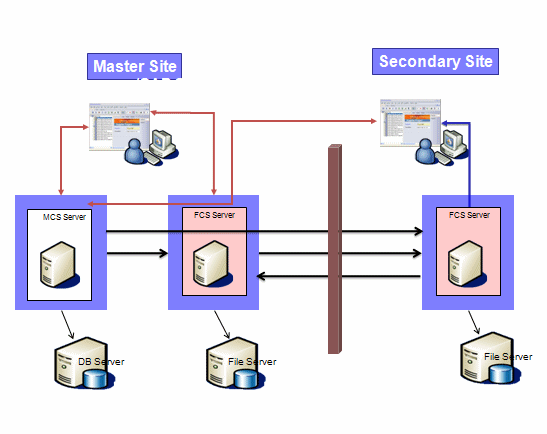Processing File Checkin and Checkout
When a user checks in or checks out a file, FCS first determines the preferred site (see The Preferred Site). Then FCS sends encrypted tickets and receipts between the FCS and MCS to send meta data and accomplish the file checkin/checkout.
The following diagram illustrates a typical configuration with a single
3DSpace Service or Main Collaboration Server (MCS) and
one or more FCSs. 
The following table explains a typical file checkin process.
| FCS Component | Description |
|---|---|
| Client/Browser | The client browser requests a file storage operation.
If the FCS is configured on this LAN, then the FCS intercepts the request
and processes it based on the ticket passed by the client. The FCS supports: Browser-based and HTTP clients. |
| File Protocol | The system uses HTTP/S for the checkin request
and all encrypted ticket/receipt transfers. The FCS checks in and checks
out files from the store or location. The FCS uses HTTP/S to get the store/location information from the 3DSpace Service. The 3DSpace Service communicates with the database over a LAN connection. The connection to the database, via a WAN connection, is eliminated. |
| MCS | Systems are typically configured for a single MCS and one or more FCSs servicing the local requests. |
| Tickets and Receipts | Tickets and receipts are the vehicle for moving information between the 3DSpace Service and the FCS. They provide added security. |
| Triggers | The FCS uses triggers with Java Programming
Objects (JPOs) during checkin and checkout operations. Supported triggers
include: Check--Fires before an event Action--Fires after an event When a trigger fails, the system rolls back the transaction. The Override trigger type is not supported by the FCS. |
A file checkout transaction operates in a similar way, with the MCS
creating the checkout job ticket, which the client machine forwards to
the FCS. The FCS then copies the file to the client and returns a receipt
that is sent back to the MCS. Settings in web.xml allow you to control
how long a ticket or receipt is valid and how many tickets or receipts
are kept before deleted.